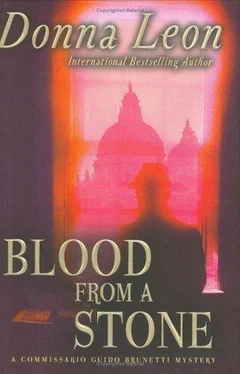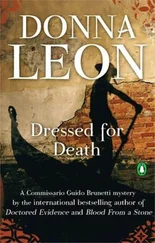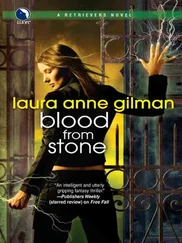Donna Leon - Blood from a stone
Здесь есть возможность читать онлайн «Donna Leon - Blood from a stone» весь текст электронной книги совершенно бесплатно (целиком полную версию без сокращений). В некоторых случаях можно слушать аудио, скачать через торрент в формате fb2 и присутствует краткое содержание. Год выпуска: 2005, Жанр: Детектив, на русском языке. Описание произведения, (предисловие) а так же отзывы посетителей доступны на портале библиотеки ЛибКат.
- Название:Blood from a stone
- Автор:
- Жанр:
- Год:2005
- ISBN:нет данных
- Рейтинг книги:4 / 5. Голосов: 1
-
Избранное:Добавить в избранное
- Отзывы:
-
Ваша оценка:
- 80
- 1
- 2
- 3
- 4
- 5
Blood from a stone: краткое содержание, описание и аннотация
Предлагаем к чтению аннотацию, описание, краткое содержание или предисловие (зависит от того, что написал сам автор книги «Blood from a stone»). Если вы не нашли необходимую информацию о книге — напишите в комментариях, мы постараемся отыскать её.
Blood from a stone — читать онлайн бесплатно полную книгу (весь текст) целиком
Ниже представлен текст книги, разбитый по страницам. Система сохранения места последней прочитанной страницы, позволяет с удобством читать онлайн бесплатно книгу «Blood from a stone», без необходимости каждый раз заново искать на чём Вы остановились. Поставьте закладку, и сможете в любой момент перейти на страницу, на которой закончили чтение.
Интервал:
Закладка:

Donna Leon. Blood from a stone
(Commissario Brunetti — 14)
for Gesine Lübben
Weil ein Schwarzer hässlich ist.
Ist mir denn kein Herz gegeben?
Bin ich nicht von Fleisch und Blut?
Thus a Blackmoor is considered ugly.
Didn’t I receive a heart as well?
Aren’t I made of flesh and blood?
— Mozart, Die Zauberflöte
1
Two men passed under the wooden arch that led into Campo Santo Stefano, their bodies harlequined by the coloured Christmas lights suspended above them. Brighter light splashed from the stalls of the Christmas market, where vendors and producers from different regions of Italy tempted shoppers with their local specialities: dark-skinned cheeses and packages of paper-thin bread from Sardinia, olives in varying shape and colour from the entire length of the peninsula; oil and cheese from Tuscany; salami of all lengths, compositions, and diameters from Reggio Emilia. Occasionally one of the men behind the counters shouted out a brief hymn to the quality of his wares: ‘Signori, taste this cheese and taste heaven’; ‘It’s late and I want to go to dinner: only nine Euros a kilo until they’re gone’; ‘Taste this pecorino, signori, best in the world’.
The two men passed the stalls, deaf to the blandishments of the merchants, blind to the pyramids of salami stacked on the counters on either side. Last-minute buyers, their number reduced by the cold, requested products they all suspected could be found at better prices and of more reliable quality at their local shops. But how better to celebrate the season than by taking advantage of shops that were open even on this Sunday, and how better to assert one’s independence and character than by buying something unnecessary?
At the far end of the campo , beyond the last of the prefabricated wooden stalls, the men paused. The taller of them glanced at his watch, though they had both checked the time on the clock on the wall of the church. The official closing time, seven-thirty, had passed more than a quarter of an hour before, but it was unlikely that anyone would be out in this cold to check that the stalls ceased trading at the correct time. ‘ Allora? ’ the short one asked, glancing at his companion.
The taller man took off his gloves, folded them and put them in the left pocket of his overcoat, then jammed his hands into his pockets. The other did the same. Both of them wore hats, the tall one a dark grey Borsalino and the other a fur cap with ear flaps. Both had woollen scarves wrapped around their necks, and as they stepped beyond the circle of light from the last stand, they pulled them a bit higher, up around their ears, no strange thing to do in the face of the wind that came at them from the direction of the Grand Canal, just around the corner of the church of San Vidal.
The wind forced them to lower their faces as they started forward, shoulders hunched, hands kept warm in their pockets. Twenty metres from the last stall, on either side of the way, small groups of tall black men busied themselves spreading sheets on the ground, anchoring them at each corner with a woman’s bag. As soon as the sheets were in place, they began to pull samples of various shapes and sizes from enormous sausage-shaped bags that sat on the ground all around them.
Here a Prada, there a Gucci, between them a Louis Vuitton: the bags huddled together in a promiscuity usually seen only in stores large enough to offer franchises to all of the competing designers. Quickly, with the speed that comes of long experience, the men bent or knelt to place their wares on the sheets. Some arranged them in triangles; others preferred ordered rows of neatly aligned bags. One whimsically arranged his in a circle, but when he stepped back to inspect the result and saw the way an outsized dark brown Prada shoulder bag disturbed the general symmetry, he quickly reformed them into straight lines, where the Prada could anchor their ranks from the back left corner.
Occasionally the black men spoke to one another, saying those things that men who work together say to pass the time: how one hadn’t slept well the night before, how cold it was, how another hoped his son had passed the entrance exam for the private school, how much they missed their wives. When each was satisfied with the arrangement of his bags, he rose to his feet and moved back behind his sheet, usually to one corner or the other so that he could continue to talk to the man who worked next to him. Most of them were tall, and all of them were slender. What could be seen of their skin, their faces and their hands, was the glossy black of Africans whose ancestry had not been diluted by contact with whites. Whether moving or motionless, they exuded an atmosphere not only of good health but of good spirits, as if the idea of standing around in freezing temperatures, trying to sell counterfeit bags to tourists, was the greatest fun they could think of to have that evening.
Opposite them a small group was gathered around three buskers, two violinists and a cellist, who were playing a piece that sounded both baroque and out of tune. Because the musicians played with enthusiasm and were young, the small crowd that had gathered was pleased with them, and not a few of them stepped forward to drop coins into the violin case that lay open in front of the trio.
It was still early, probably too early for there to be much business, but the street vendors were always punctual and started work as soon as the shops closed. By ten minutes to eight, therefore, just as the two men approached, all of the Africans were standing behind their sheets, prepared for their first customers. They shifted from foot to foot, occasionally breathing on to their clasped hands in a futile attempt to warm them.
The two white men paused just at the end of the row of sheets, appearing to talk to one another, though neither spoke. They kept their heads lowered and their faces out of the wind, but now and then one of them raised his eyes to study the line of black men. The tall man placed his hand on the other’s arm, pointed with his chin towards one of the Africans, and said something. As he spoke, a large group of elderly people wearing gym shoes and thick down parkas, a combination that made them look like wrinkled toddlers, flowed around the corner of the church and into the funnel created by the buskers on one side, the Africans on the other. The first few stopped, waiting for those behind to catch up, and when the group was again a unit, they started forward, laughing and talking, calling to one another to come and look at the bags. Without pushing or jostling, they assembled themselves three-deep in front of the line of Black men and their exposed wares.
The taller of the two men started towards the group of tourists, his companion following close behind. They halted on the same side as the church, careful to stand behind two elderly couples who were pointing at some of the bags and asking prices. At first the man whose sheet it was did not notice the two, since he was attending to the questions of his potential customers. But suddenly he stopped talking and grew tense, like an animal scenting menace on the wind.
The black man at the next sheet, aware of his colleague’s distraction, turned his attention to the tourists and decided instantly that he would have good luck with them. Their shoes told him to speak English, and he began: ‘Gucci, Missoni, Armani, Trussardi. I have them all, ladies and gentlemen. Right from factory.’ In the dimmer light here, his teeth glowed with Cheshire cat brilliance.
Читать дальшеИнтервал:
Закладка:
Похожие книги на «Blood from a stone»
Представляем Вашему вниманию похожие книги на «Blood from a stone» списком для выбора. Мы отобрали схожую по названию и смыслу литературу в надежде предоставить читателям больше вариантов отыскать новые, интересные, ещё непрочитанные произведения.
Обсуждение, отзывы о книге «Blood from a stone» и просто собственные мнения читателей. Оставьте ваши комментарии, напишите, что Вы думаете о произведении, его смысле или главных героях. Укажите что конкретно понравилось, а что нет, и почему Вы так считаете.












